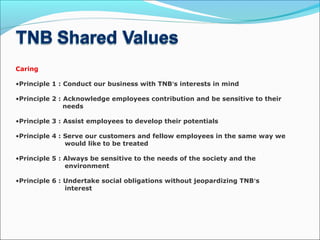TNB is the largest electricity utility company in Malaysia, providing generation, transmission, and distribution of electricity across Peninsular Malaysia, Sabah, and Labuan. It has over 33,500 employees serving over 8.3 million customers. TNB traces its origins back to 1949 when it was established as the Central Electricity Board to power Malaysia's national development through reliable and efficient electricity provision.




























